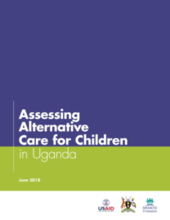In 2017, the USAID Displaced Children and Orphans Fund (DCOF) of the United States Agency for International Development (USAID) engaged the USAID-funded MEASURE Evaluation to build on and reinforce progress in advancing national efforts on behalf of children who lack adequate family-based care in Uganda. MEASURE Evaluation worked with a Country Core Team (CCT), led by the Ministry of Gender, Labor and Social Development (MGLSD) and comprising government partners and other stakeholders, to design, plan, and conduct a participatory self-assessment of the national alternative care system. The assessment was conducted during a 45-person multi-stakeholder participatory workshop, from November 27 to 30, 2017. The purpose of the assessment workshop was to inform action planning to address high-priority needs identified in alternative care for children. The assessment process and subsequent action planning session will help strengthen country capacity to gather, interpret and use high quality data to make program and policy decisions to improve outcomes for children, rendering this activity an important part of MEASURE Evaluation’s work to strengthen mechanisms that underpin and improve the delivery of services.
Overall, the findings and recommendations were reviewed and validated by the CCT and are intended for use by the MGLSD, and other implementing partners working in the alternative care space, to facilitate the identification of high-priority actions that improve programming for children in alternative care in Uganda. Below is a summary of the key findings, organized by system component:
-
Leadership and governance
-
Service delivery
-
Workforce
-
Monitoring, evaluation, and information systems
-
Social norms and practices
-
Financing

